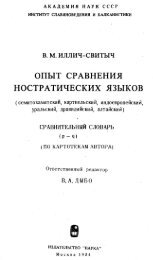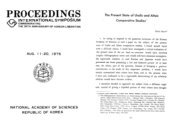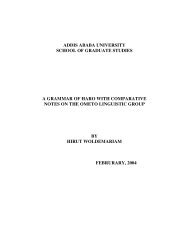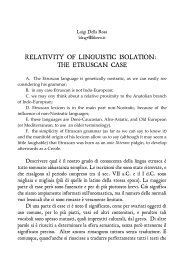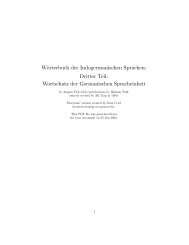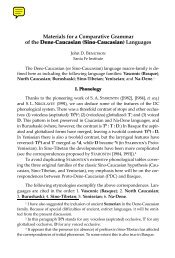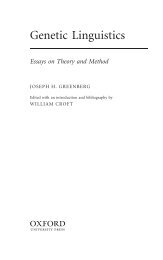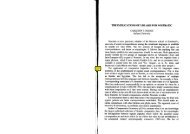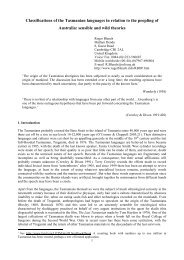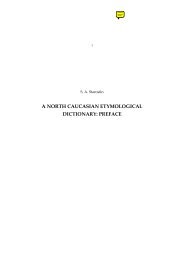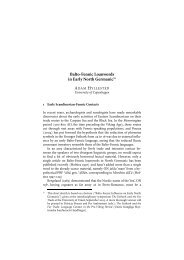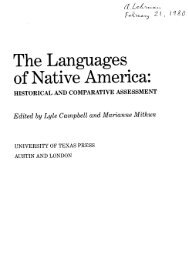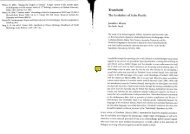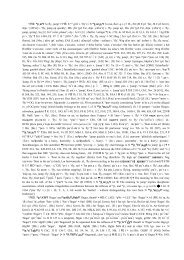The Indo-European Elements in Hurrian
The Indo-European Elements in Hurrian
The Indo-European Elements in Hurrian
You also want an ePaper? Increase the reach of your titles
YUMPU automatically turns print PDFs into web optimized ePapers that Google loves.
5. Pronouns, Numerals, Adpositions, Conjunctions, Adverbs 59<br />
6. ayi-da, aye ‘<strong>in</strong> the presence of’<br />
7. edi-da, edi-wa ‘for, because of’; edi-ye ‘concern<strong>in</strong>g’ (from edi ‘body, person’)<br />
8. ¯enni ‘now’<br />
9. guru ‘anew, once aga<strong>in</strong>’<br />
10. <strong>in</strong>na ‘when’<br />
11. <strong>in</strong>u ‘how’<br />
12. ma ‘and’<br />
13. panu ‘although’<br />
14. šummi ‘with’ (from the word šummi ‘hand’)<br />
15. tiššan ‘very much’<br />
16. tumwa ‘under’<br />
17. undu ‘then, when’<br />
18. wuri-da ‘<strong>in</strong> sight of’ (from wur- ‘to see’)<br />
<strong>The</strong> follow<strong>in</strong>g parallels with <strong>Indo</strong>-<strong>European</strong> may be noted:<br />
1. <strong>Hurrian</strong> abi-n- ‘before’ and abi-da ‘toward’: Compare the Proto-<strong>Indo</strong>-<strong>European</strong> preposition<br />
*H÷obhi ‘to, towards; <strong>in</strong> front of, before; beyond’ found <strong>in</strong>: Sanskrit abhí ‘to, towards’;<br />
Gatha-Avestan aibī ‘to, unto, over’; Old Persian abiy ‘to, aga<strong>in</strong>st, <strong>in</strong> addition to’; Old Church<br />
Slavic obь ‘beyond’; Lat<strong>in</strong> ob ‘<strong>in</strong> front of, before’.<br />
2. <strong>Hurrian</strong> adi ‘thus, so’: Compare: Sanskrit ádh` ‘therefore, now, then; moreover, so much<br />
the more; and, partly’, ádha…ádha ‘as much as; partly partly’; Avestan aδa ‘then, so’; Old<br />
Persian ada- ‘then’.<br />
3. <strong>Hurrian</strong> ai ‘when, if’: Note the follow<strong>in</strong>g: Hittite enclitic particle -a ‘but’; Old Church<br />
Slavic a ‘but, and’; Lithuanian õ ‘but’. Accord<strong>in</strong>g to Mann (1984—1987:1), these are to be<br />
derived from Proto-<strong>Indo</strong>-<strong>European</strong> *ā ‘and, or, but’, while Puhvel (1984— .1/2:9—10) sees<br />
them as adverbial forms of the pronom<strong>in</strong>al stem *e-/*o-.<br />
4. <strong>Hurrian</strong> guru ‘anew, once aga<strong>in</strong>’: Perhaps to be compared with the Proto-<strong>Indo</strong>-<strong>European</strong><br />
stem *k¦3t- found <strong>in</strong>: Welsh pryd (< *k¦3tu-) ‘time’; Oscan -pert <strong>in</strong> petiro-pert ‘four times’;<br />
Sanskrit -k0t ‘…time(s)’ <strong>in</strong> sa-k1t ‘once’.<br />
5. <strong>Hurrian</strong> ma ‘and’: Note the Hittite enclitic particle -ma ‘however, but, and’. This particle is<br />
also found <strong>in</strong> the other Anatolian languages: Palaic -ma (mean<strong>in</strong>g uncerta<strong>in</strong>); Lydian enclitic<br />
-m; Lycian stressed particle me. This has been compared with Greek (<strong>The</strong>ssalian) μά = δέ<br />
‘but’.<br />
6. <strong>Hurrian</strong> šummi ‘with’: This may be compared with the Proto-<strong>Indo</strong>-<strong>European</strong> stem *sem-<br />
/*si- ‘together with’, found, for example, <strong>in</strong> Sanskrit <strong>in</strong> its reduced form sa- (< *si-) <strong>in</strong> sak1t<br />
‘once’ cited above (full-grade sám ‘with, along with, together with, together, altogether’)<br />
and <strong>in</strong> Lat<strong>in</strong> <strong>in</strong> sem-per ‘always’ (for more, cf. Pokorny 1959:902—905). This stem also<br />
provides the basis for the Greek, Armenian, and Tocharian numeral ‘1’ (Greek εpς [< *sems],<br />
σμία; Armenian mi; Tocharian A sas, B [e).<br />
7. <strong>Hurrian</strong> undu ‘then, when’: Compare Proto-<strong>Indo</strong>-<strong>European</strong> *H÷endh-/*H÷‚dh- ‘here, there;<br />
thereupon, then; when’ <strong>in</strong>: Armenian and ‘there, yonder’; Greek hνθα ‘here and there, hither<br />
and thither; thereupon, then, just then; where, whither; when’, hνθεν ‘thence; thereupon,



